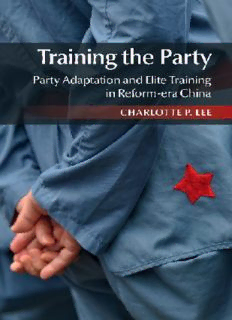
Training the Party: Party Adaptation and Elite Training in Reform-era China PDF
Preview Training the Party: Party Adaptation and Elite Training in Reform-era China
Training the Party CharlotteLeeconsidersorganizationalchangestakingplacewithinthe contemporary Chinese Communist Party (CCP), examining the party’s renewed emphasis on an understudied but core set of organizations: party-managed training academies or “party schools.” This national network of organizations enables party authorities to exert political control over the knowledge, skills, and careers of officials. Drawing on in-depth field research and novel datasets, Lee finds that the party school system has not been immune to broader market-basedreformsbutinsteadhasincorporatedmanyofthesame strategies as actors in China’s hybrid, state-led private sector. In the searchforrevenueandstatus,schoolshaveupdatedtraining content and become more entrepreneurial as they compete and collaborate withdomesticandinternationalactors.Thisbookdrawsattentionto surprisingdynamismlocatedwithinthepartyinpoliticalorganizations thought immune to change, and to the transformative effect of the marketonChina’spoliticalsystem. charlotte lee is Associate Director of the China Program at Stanford University’s Shorenstein Asia-Pacific Research Center. Prior to joining the Stanford China Program, she taught courses in Chinese politics, comparative politics, and international relations at Hamilton College and the United States Air Force Academy. Her research focuses on the institutions of authoritarian regimes, public bureaucracies,organizations,andcontemporaryChinesepolitics.She holds a doctoratein political science from Stanford University and a Bachelor of Arts in political economy and Asian studies from the UniversityofCalifornia,Berkeley. Training the Party Party Adaptation and Elite Training in Reform-era China Charlotte P. Lee StanfordUniversity UniversityPrintingHouse,CambridgeCB28BS,UnitedKingdom CambridgeUniversityPressispartoftheUniversityofCambridge. ItfurtherstheUniversity’smissionbydisseminatingknowledgeinthepursuitof education,learningandresearchatthehighestinternationallevelsofexcellence. www.cambridge.org Informationonthistitle:www.cambridge.org/9781107090637 ©CharlotteP.Lee2015 Thispublicationisincopyright.Subjecttostatutoryexception andtotheprovisionsofrelevantcollectivelicensingagreements, noreproductionofanypartmaytakeplacewithoutthewritten permissionofCambridgeUniversityPress. Firstpublished2015 AcataloguerecordforthispublicationisavailablefromtheBritishLibrary LibraryofCongressCataloguinginPublicationdata Lee,CharlotteP.,1969– Trainingtheparty:partyadaptationandelitetraininginreform-era China/CharlotteP.Lee. pages cm Includesbibliographicalreferencesandindex. ISBN978-1-107-09063-7 1. Zhongguogongchandang. 2. China–Politicsandgovernment–1949 I. Title. JQ1519.A5C349 2015 324.2510075–dc23 2015004121 ISBN978-1-107-09063-7Hardback CambridgeUniversityPresshasnoresponsibilityforthepersistenceoraccuracyof URLsforexternalorthird-partyinternetwebsitesreferredtointhispublication, anddoesnotguaranteethatanycontentonsuchwebsitesis,orwillremain, accurateorappropriate. Contents Listoffigures vii Listoftables ix Acknowledgments xi 1 Introduction 1 2 Theorganizationallandscape:partyschools’development andorganization 28 3 Managingthemanagers:partyschoolsasapipeline tohigheroffice 55 4 Fusingpartyandmarket:introducingmarket-based incentivestothepartyschoolsystem 89 5 Theentrepreneurialpartyschool:partyschoolresponses toreforms 123 6 Adaptationmeasured:contentanalysisofpartyschool training 157 7 Conclusion:risksandlimitstopartyschool reforms 178 Appendices A Numberofpartyschools,bylocaleandnationalshareof leadingcadres 202 B Noteonsourcesandresearchmethods 203 C CentralPartySchoolorganization 208 D CityZtrainingallocations,2008 209 E DescriptivestatisticsandrobustnesstestsofPSM presentedinChapter3 212 F CentralPartySchoolMid-CareerCadreTraining Classesdescriptivedata 221 v vi Contents G Internationalpartnerships,centralandprovincial-level partyschools 224 H Categoriesforcodingtrainingsyllabi 227 References 229 Index 247 Figures 2.1 Localpartyorgansinvolvedincadreeducation (district-levelexample) 36 2.2 Governmentorgansinvolvedincivilservantandcadre education(district-levelexample) 37 3.1 Frequencyofadministrativerank,2003ChinaGSS 67 3.2 Prematchpropensityscoredistribution 74 3.3 Postmatchpropensityscoredistribution 74 4.1 Central-levelorganizationsofcadretraining 101 4.2 Shareoftotaltraining,byschooltype 117 4.3 CentralPartySchooltraineevolume,1977–2000 119 4.4 Timelineofdomestictrainingproviders 121 6.1 PercentofCPStrainingclasstimededicatedto partybuildingcontent,1983–2007 160 6.2 PercentofCPStrainingtimededicatedtoorthodox theory,1983–2007 163 6.3 PercentofCPStrainingtimededicatedtothetheoriesof reform-eraleaders,1983–2007 164 6.4 PercentofCPStrainingclasstimededicatedto managementcontent,1983–2007 165 6.5 PercentofCPStrainingclasstimededicatedtobriefings, 1983–2007 166 6.6 PercentofCPStrainingclasstimededicatedtopolicy andlawcontent,1983–2007 167 6.7 Mid-careercadretrainingclasstrainingcontent, 2007–08 174 B.1 CadrepopulationandGDPpercapita,coastalregion 205 B.2 CadrepopulationandGDPpercapita,centralregion 205 B.3 LeadingcadrepopulationandGDPpercapita, coastalregion 206 B.4 LeadingcadrepopulationandGDPpercapita, centralregion 206 vii viii Listoffigures B.5 LeadingcadrepopulationandGDPpercapita,all regions 207 B.6 CadrepopulationandGDPpercapita,allregions 207 E.1 Absolutedistancebetweenthepropensityscoresofeach treatmentobservationandnearestneighbormatch 216
Description: